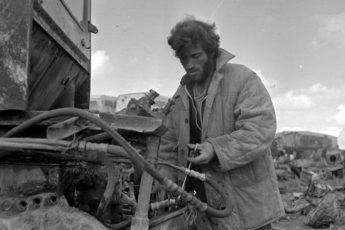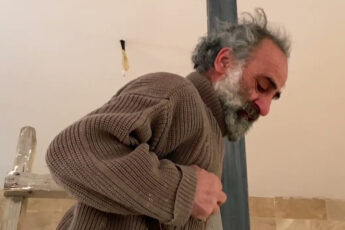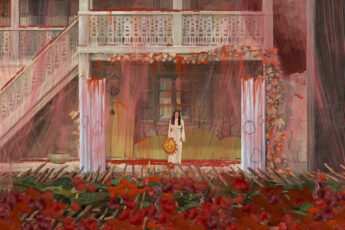
We met Armenian filmmaker Shoghakat Vardanyan during the Armenian Film Festival London (December 6–8, 2024), where her debut documentary “1489” was screened. The director recalls her family’s ordeal after her brother’s disappearance during Armenia’s 2020 war with Azerbaijan. We spoke about the role of music in editing, the loneliness of going through war, and the difficulties of making a deeply personal film as a woman filmmaker.
Could you tell us a little bit more about how you came to make this film? What was your situation like when you started filming? When did you know that you wanted to document what you and your family were going through?
You know, I’m a classical pianist by profession, a concert pianist. When the war started and my brother went missing on the seventh day of the war, words and music vanished from my life. I couldn’t speak about what was happening, but of course a lot was going on.
I was searching for my brother, visiting hospitals, entering every room to talk to soldiers, showing them his photo. I saw soldiers, totally burnt, who were unconscious. Everyone was going there to find out whether it’s their son or brother who had been brought in. But my father and I couldn’t find any information about my brother.
In September 2020, I wanted to try something new and so I started a journalism course. In that school we didn’t study filmmaking. But on the days when my brother went missing, it was time to take a camera and make our first reportage. I couldn’t concentrate on my classes anymore – so I thought they were going to throw me out!
Then I got a call from the director and the journalism teacher. They suggested I take a phone and sit in front of it in my room after returning home from searching for my brother, like in a video blog. I tried what they suggested just once, but didn’t like the result, it was pathetic and I didn’t like it.
The next day, I took the phone to a café to see my friends. I put it in the café and was trying to figure out how to actually use it. On the third day, I entered my father’s studio – this is the beginning of the film – without the phone on the stand. We started talking, and I felt something. I took out my own phone and started filming him.
Rewatching the video later, in my room, I understood that this was what I needed to do. This way, I was slowly figuring out what to film and how to go about it. For a long time, I didn’t understand that this would become a film; it was just an urge of mine. It felt like a way of processing things, and I took it very seriously.
When I showed my journalism teacher the video I had made of my father, she said that it was very cinematic. She encouraged me to continue. She joked that my brother would soon come back, that I will show him these videos and he’ll feel bad for not answering our calls! I took the filming very seriously, fearing my brother might not come back. My inner feeling pushed me to do that. I didn’t know yet what it was, but I had to continue doing it.
At some point, I also developed another feeling: maybe this will help to illustrate the pain of others going through any war. I felt very lonely myself when I was making the film. Even people around me, Armenians, who were themselves suffering from the war, didn’t have a family member missing during the war. They really couldn’t understand what I was going through so I thought I could share my own experiences as well as those of others trapped in a similar situation.
Watching the film, it felt as if your family was also sharing something through the camera. Your father seemed engaged, directing you to film certain things. Was there a more immediate sense of communication and sharing in making this film?
Right, but it only came much later. In the first days of making the film, my father joked around, asking if I was a journalist: “Why are you coming up to me with a camera?” And there were some very heavy moments, when he was in deep pain and anger. In those moments, he would tell me to turn off the camera. I then had to wait a few days until I felt that I could film him again. My mother didn’t let me film her for a long time but suddenly she let me do it – without saying anything. They eventually got used to it. In the scene with the little bird, my father even started directing me where to stand and film.
You mentioned the absence of music in the film. As a musician, did this influence your approach to the film?
The absence of music was motivated by my wanting to capture reality. At the beginning, I didn’t consciously think about it. I filmed and there was no music. My composer friend asked me why I didn’t use any music, and I realized that there shouldn’t be any music. There can’t be any music. My experience with music of course helped me, but in a different way. Classical music helped me in the editing process.
When I was editing the film, I was looking at the material in the same way I am reading musical notation. I wasn’t thinking about what I want to do with the material; I was trying to understand what the material wants from me. I was the instrument in the editing process. During filming, it was like musical improvisation, I was capturing moments as they happened.
I didn’t know what would happen the next second; my brain was burning: how do I take the next shot? How do I fill the pauses and silence? How and when do I move? Do I even move, or not? The feeling of rhythm from music helped me as well.
It was extremely difficult because, at the same time that I was filming the film, I was a daughter and sister going through that all. During the editing process I needed to put aside my being a sister and daughter and watch hundreds of hours of material over and over again to be able to edit it as a film director.
And the biggest part of the material, eighty hours, I shot in the first five months – until the moment where my father can be seen walking through the dark room, clinching the papers to his face. This was when the first and second DNA analyses came, in Armenia.
At that moment, I created an archive for my brother, with footage of him playing the piano at his last concert before going to the army. The concert was a kind of accident, it wasn’t planned, they just asked him to go and play during the concert. This was an important piece of final footage of him. I put it into my film, and I was thinking about that for a very long time.
I thought at first that it needed to be there, but I had a lot of questions about it. I didn’t know why it was there. And then, in the next year and a half two things happened. One is that I sent my brother’s bone samples to Europe for DNA analysis. At the same time, I was trying to figure out how the industry worked, because everybody was telling me that I need to have a producer, co-producer, that I can’t do it alone.
But in the end, I chose to do it on my own because I didn’t like what I was being suggested. My intuition was telling me that the film was not finished yet. Everybody was telling me that I was killing the film, that the world needs to see it, that I need to finish it and send it to festivals. If I can’t do it, they told me, I need them to do it, I am not a director, I can’t finish it… just a little girl who can’t do it!
And then, when the DNA analysis came back, I had to bring back my brother’s bones. At that moment I felt that I had to film again. I started filming and understood that I had been waiting for one and a half years without knowing for what exactly. And I understood that now I would finish the film. Those were truly the last scenes. And in the very last one, the morgue scene, we didn’t know that there were so many parts of his body left.
In Armenia, women don’t participate in some parts of the burial ceremony. For example, we are not supposed to go to the morgue; women shouldn’t see how the bodies are put into the ground. It’s to protect women who haven’t given birth yet from the stress and trauma. But of course, those traditions vanish little by little.
On that day, when my father was going to the morgue, I wanted to accompany him, to not let him go on his own. I was standing outside at that moment, and he came and asked me to come along and take photos. They were showing him small samples with codes, the same samples I had earlier given to my parents. And when he asked me to take pictures, I started filming. They took us inside the morgue, and I continued filming. I think they thought I had gone crazy – they let me film it without stopping me!
It feels as if the film also needed your closure, your family’s closure. It’s an organic ending; you can see that. You have been showing your film at more than thirty festivals this year. You spoke about this urge to share this experience with others, especially those who are also going through war. Everyone experiences it differently, each family. My last question is how people have reacted to your film, both in Armenia and abroad? And how might this have changed your own perspective on what you were going through?
The reactions were as expected. After screenings, there is silence, nobody can speak. And everybody is very emotional. People were crying during the film. Abroad, it’s the same, it doesn’t matter which country, even in China. It was the same in Armenia, but of course it was more personal and heavy there. It was very, very emotional in Armenia. Even before the film started, people were already crying.
When I went on stage before the film to say a few words, people were standing up, clapping and crying. It was like that only in Armenia of course. But the reaction afterwards was the same everywhere, showing that it’s not just about sharing Armenian pain but everybody’s pain. It doesn’t matter which country it is that has had to go through war. And those who haven’t experienced war are being educated about what it is to go through war.
I also wanted to tell you why I decided not to show my brother’s archive in the end. It was a really hard choice as a sister. But I decided that if I don’t put it there, my film is about everybody, through my brother and our story.
Thank you for sharing your thoughts on this very special film, and thank you very much for the interview.




Leave a Comment